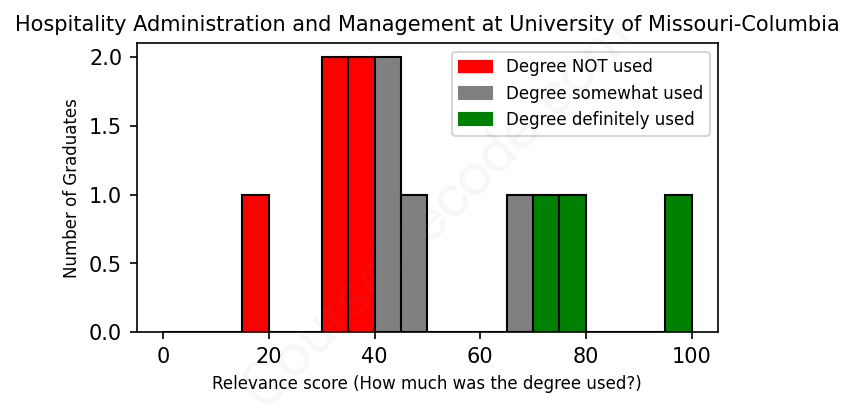
First, some facts. Of the Hospitality Administration and Management graduates from University of Missouri-Columbia we've analyzed , here's how many have used (or NOT used) their degree in their career:

These are estimates based on AI analysis of 12 LinkedIn profiles (see below).
The verdict? Significantly below average. Overall, with an average relevance score of 49%, Hospitality Administration and Management graduates from University of Missouri-Columbia have a much lower likelihood (-18%) of finding work in this field compared to the average graduate across all fields:
And for comparison, here's the chart for all profiles we've looked at across all degrees.
Also, after graduating, only 0% of these graduates have pursued further education other than another Bachelor's degree (such as a Masters degree or other), compared to the average across all profiles of 35%. This suggests a Bachelors degree is enough for most Hospitality Administration and Management graduates, and it's normal to look for work straight after graduation.
See the details:
|
Relevance score: 36% We think this person has NOT gone into a career related to their degree. We think this person has NOT gone into a career related to their degree.
DEGREE INFOGraduated in 2015 from University of Missouri-Columbia with a Bachelor's Degree in Hospitality Administration and Management. No other secondary education since. JOB HISTORY SINCE GRADUATIONRevenue Processing Tech I Missouri Department Of Revenue Aug 2018 - Mar 2019 Administrative Office Support Assistant  Missouri Department Of Revenue Mar 2019 - Apr 2020 Customer Service Manager  Missouri Department Of Revenue Apr 2020 - Present ABOUTNo information provided. |
The top 10 most common jobs done by the graduates we've analyzed (ranked most common to least) are:
When looking at the job paths of individuals who graduated with a degree in Hospitality Administration and Management from the University of Missouri-Columbia, a few trends emerge. Many graduates have moved into roles related to customer service, recruitment, or management, often in areas like event coordination and restaurant supervision. Positions such as Front Desk Agent, Food and Beverage Supervisor, or Assistant Manager at restaurants highlight the direct application of their education. These roles typically utilize the hospitality skills they've developed, including customer service, operations management, and event planning, which are all essential elements in the hospitality sector.
However, there are also several instances where graduates have shifted into unrelated fields. Many have found jobs in recruitment or administrative roles, which, while they may benefit from customer service and people skills, do not necessarily require the specialized knowledge that comes from studying hospitality management. Jobs like Licensed Realtor and Technical Recruiter have shown that some graduates have taken a path far removed from what they studied. Overall, while there are definitely relevant and applicable roles aligned with their degree, many individuals have veered into areas that don't fully leverage the skills and knowledge they gained during their studies, which could lead to a mix of satisfaction and missed opportunities for applying their hospitality training directly.
Here is a visual representation of the most common words in job titles for Hospitality Administration and Management graduates (this is across all Hospitality Administration and Management graduates we've analyzed, not just those who went to University of Missouri-Columbia):

Looking at the career trajectories of graduates from the University of Missouri-Columbia's Hospitality Administration and Management program, it seems like there's a bit of a mixed bag when it comes to their professional paths. Right after graduation, many people tend to start in positions fairly related to hospitality, like bartending, front desk roles, or even various administrative positions. However, some have also veered off into areas like recruitment, real estate, and even sales. It seems like the degree provides a solid foundation, but the first jobs taken by many graduates don’t always stay strictly within the hospitality field.
Fast forward five to ten years, and it appears that some graduates manage to climb a bit higher in the hospitality realm, taking on roles like catering supervisors or food service supervisors, while others have ventured into totally different industries such as recruitment and sales management. It’s clear that while some stick it out in hospitality roles, others have found success in paths that may not directly relate to their degree. This suggests that while a degree in Hospitality Administration and Management can open doors in hospitality, it also offers versatility, allowing graduates to pursue diverse career options. Overall, there’s a blend of success and some uncertainty, but it looks like many are finding ways to leverage their education in a variety of fields, even if they don’t end up directly in hospitality careers long-term.
Getting a Bachelor’s degree in Hospitality Administration and Management, like the one at the University of Missouri-Columbia, is generally on the easier side compared to some other degree programs. It combines a mix of practical skills and a bit of theory, so if you're someone who enjoys hands-on work and interacting with others, you might find it pretty manageable. Sure, you'll have your assignments and maybe some projects, but overall, a lot of it leans towards real-world applications in hospitality settings, which can make it engaging and less stressful. Just be prepared to balance your coursework with teamwork and possibly some busy internship experiences, and you should be good to go!
Most commonly, in the LinkedIn profiles we've looked at, it takes people 4 years to finish a Bachelor degree in Hospitality Administration and Management.
Looking at the career paths of these Hospitality Administration and Management grads from the University of Missouri-Columbia, it seems like a mixed bag in terms of earnings. Some have landed solid roles in recruitment or management, like the Talent Acquisition Manager and Director of Sales, which often bring in good salaries, suggesting they've made decent money over time. However, others seem to be stuck in more entry-level positions, like bartending or front desk roles, which typically don’t pay as well. The newer grads just starting out appear to be in roles that might not yet offer high pay but could grow with experience. Overall, it's a bit of a rollercoaster—while some are raking it in, others are likely still working their way up the ladder.
Here is a visual representation of the most common words seen in the "about" section of LinkedIn profiles who have a Bachelor degree in Hospitality Administration and Management (this is across all Hospitality Administration and Management graduates we've analyzed, not just those who went to University of Missouri-Columbia). This may or may not be useful:

Here are all colleges offering a Bachelor degree in Hospitality Administration and Management (ordered by the average relevance score of their Hospitality Administration and Management graduates, best to worst) where we have analyzed at least 10 of their graduates:
| College | Score | Count |
|---|---|---|
 Kendall College Kendall College
|
81 | 12 |
 University of Phoenix University of Phoenix
|
80 | 13 |
 Penn State University Penn State University
|
78 | 16 |
 University of South Carolina University of South Carolina
|
75 | 11 |
 University of North Texas University of North Texas
|
73 | 26 |
 Indiana University of Pennsylvania Indiana University of Pennsylvania
|
71 | 12 |
 University of Central Florida University of Central Florida
|
69 | 40 |
 University of Nevada-Las Vegas University of Nevada-Las Vegas
|
67 | 64 |
 CUNY New York City College of Technology CUNY New York City College of Technology
|
66 | 20 |
 Florida International University Florida International University
|
64 | 57 |
 California State Polytechnic University-Pomona California State Polytechnic University-Pomona
|
64 | 31 |
 University of Central Florida Rosen College of Hospitality Management University of Central Florida Rosen College of Hospitality Management
|
63 | 37 |
 Florida State University Florida State University
|
62 | 29 |
 Missouri State University Missouri State University
|
62 | 15 |
 James Madison University James Madison University
|
60 | 16 |
 Georgia State University Georgia State University
|
58 | 10 |
 State University of New York College at Buffalo State University of New York College at Buffalo
|
58 | 10 |
 The Ohio State University The Ohio State University
|
56 | 14 |
 Johnson & Wales University Johnson & Wales University
|
53 | 14 |
 Monroe College Monroe College
|
53 | 13 |
 East Carolina University East Carolina University
|
51 | 13 |
 University of Missouri-Columbia University of Missouri-Columbia
|
49 | 12 |
 University of South Carolina-Columbia University of South Carolina-Columbia
|
44 | 10 |
 University of Mississippi University of Mississippi
|
43 | 10 |